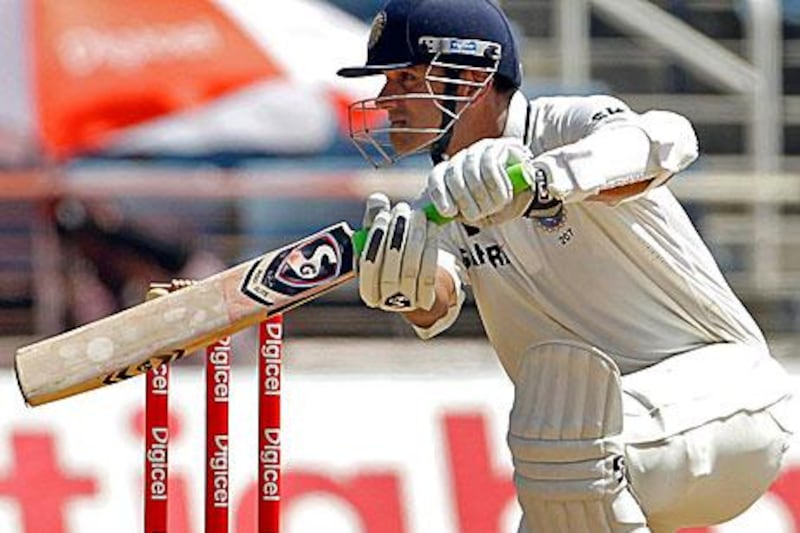We often like to imagine our sporting heroes as infallible. We tend to forget that Michael Jordan missed thousands of shots, that Tiger Woods has hooked drives and missed putts at crucial times and that Sachin Tendulkar has been out without scoring 34 times in international cricket.
Video: Inside The National
Matt Samson and Thomas Woods look back at yesterday's Wimbledon games and discuss the latest transfer talks.
Cricket Comment: Sharjah refurbishment good for cricket Read article
ICC running the risk of marginalising PCB Read article
Like us, they too wrestle with demons and gremlins. They too suffer crises of confidence and periods of self-doubt. They too can stare wistfully at greener grass on the other side. In his autobiography, Roberto Baggio, the former Juventus and AC Milan forward, writes eloquently about his penalty miss in the 1994 football World Cup final against Brazil in the United States.
"Only those who have the courage to take a penalty miss them," he said. "I failed that time. Period. And it affected me for years. It is the worst moment of my career. I still dream about it. If I could erase a moment from my career, it would be that one."
For Rahul Dravid, the nightmares were most vivid in 2008, a year in which he averaged just 30.96 from 15 Tests. Had the young pretenders cashed in, his career would have been over. Instead, he went to Mohali, for a Test match against England, and scored a career-saving hundred.
"I knew that if I didn't score runs in that innings, I could well have been dropped," he said. "I would have had no complaints about it. If that had happened, at that stage, I probably would have moved on because I couldn't see myself coming back after that."
Baggio was the consummate penalty-taker and he struggled to explain what happened that afternoon in Pasadena.
Dravid, an exemplary professional who has never left anything to chance, also has difficulty pinpointing what went wrong after 2006, when he was universally acknowledged as one of the world's premier batsmen.
One possible explanation was the anxiety that afflicts even the seasoned professional as the physical powers wane. There was also an unhappy two-year stint as captain, marred by all sorts of controversies caused by Greg Chappell, a coach intent on root-and-branch reform of Indian cricket.
When announcing his retirement in 1951, Joe DiMaggio, the baseball great, had said: "When baseball is no longer fun, it's no longer a game, and so, I've played my last game."
Dravid was in a similar place, but refused to walk away.
The mental fatigue had affected the most organised of batting techniques.
"My bottom hand was getting tighter, maybe because I was tense," he said. "So I made a conscious effort to make my bottom hand very loose.
"It's not something I've not done earlier. When you tell someone about the basics of batting, you say that the left hand dominates. It's not rocket science. But at some level, I was tightening up without being aware of it."
That he emerged from the rut is testament to the mental strength of a man who has played nearly as many roles as Laurence Olivier, the legendary late actor. Once stereotyped as a dour accumulator of runs, he scored 153 in a one-day game. He also has a 22-ball 50 to his credit.
When the lack of balance in the XI forced India to look for a makeshift one-day wicketkeeper at the start of the new millennium, it was Dravid that they turned to. One of the great slip catchers of his or any age, he did the job more competently than several specialists.
When Chappell's experiments with the batting order saw the need for a new opening partner for Virender Sehwag, it was Dravid who stepped forward once again. The man for all seasons was also the team's Mr Fix It and tagged with a nickname he hates: The Wall.
It is hard to tell how much it took out of him. There were times during his captaincy when he looked almost haunted, caught between Chappell and an unhappy dressing room, not to mention a press pack that scented blood as soon as the results started to get worse.
After the series win in England in 2007, he was almost heckled at a press conference at The Oval after India failed to push for victory. It was only when Michael Vaughan came in and said that he would have done the same thing - protected a 1-0 lead - that the hysteria abated.
Through good times and bad, one word has defined Dravid the player and human being: equanimity.
After his pivotal century in India's recent victory over the West Indies at Sabina Park, questions were raised about the failure of the new boys in the side. A more selfish man might have tried to guard his turf by putting down the competition. That is not the Dravid way.
"These youngsters are even better than we were, in terms of talent," he said.
"We put too much pressure on youngsters; we need to relax and give them time, we need to be patient with them."
In an age when icons swear into television cameras or take out super injunctions to cover up misdemeanours, Dravid has also been a classy ambassador for his sport. Win or lose, he has never been less than gracious.
Before the Mohali hundred that proved to be a lifeboat for a career caught in the squalls, he was asked how he felt.
"I need to get a big score not only for myself, but for everyone who has constantly wanted me to do well," he said. Small wonder then that thousands still hope he leaves with an Indian summer behind him.





